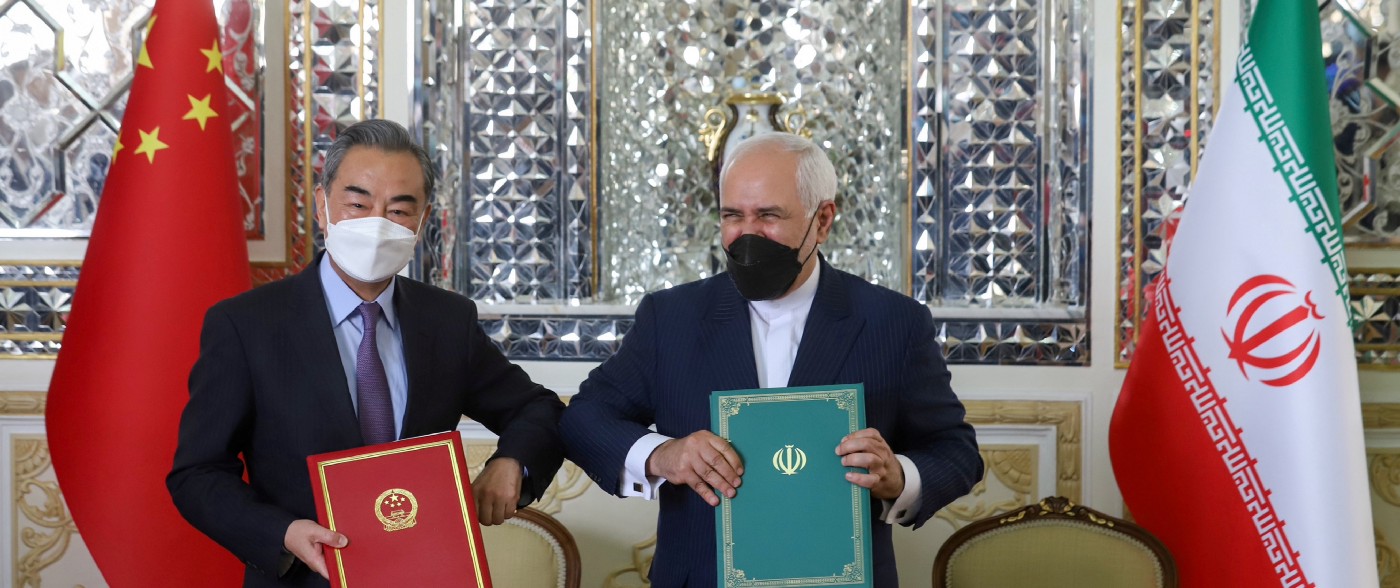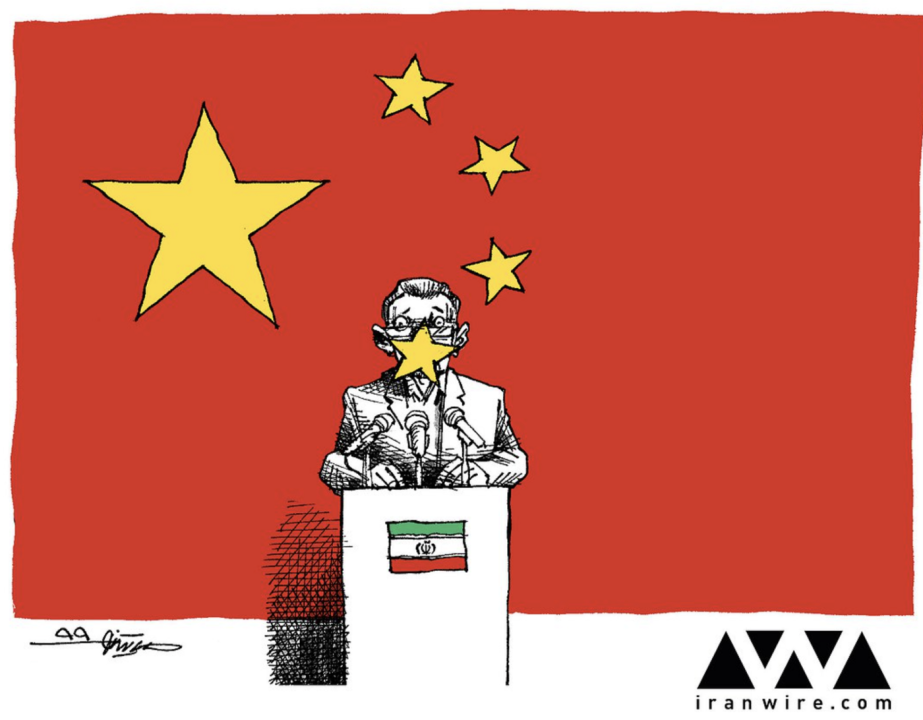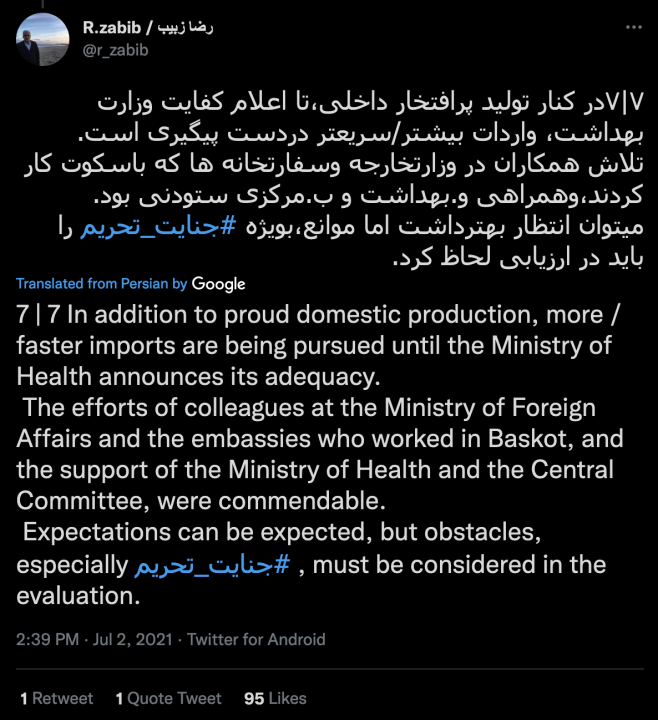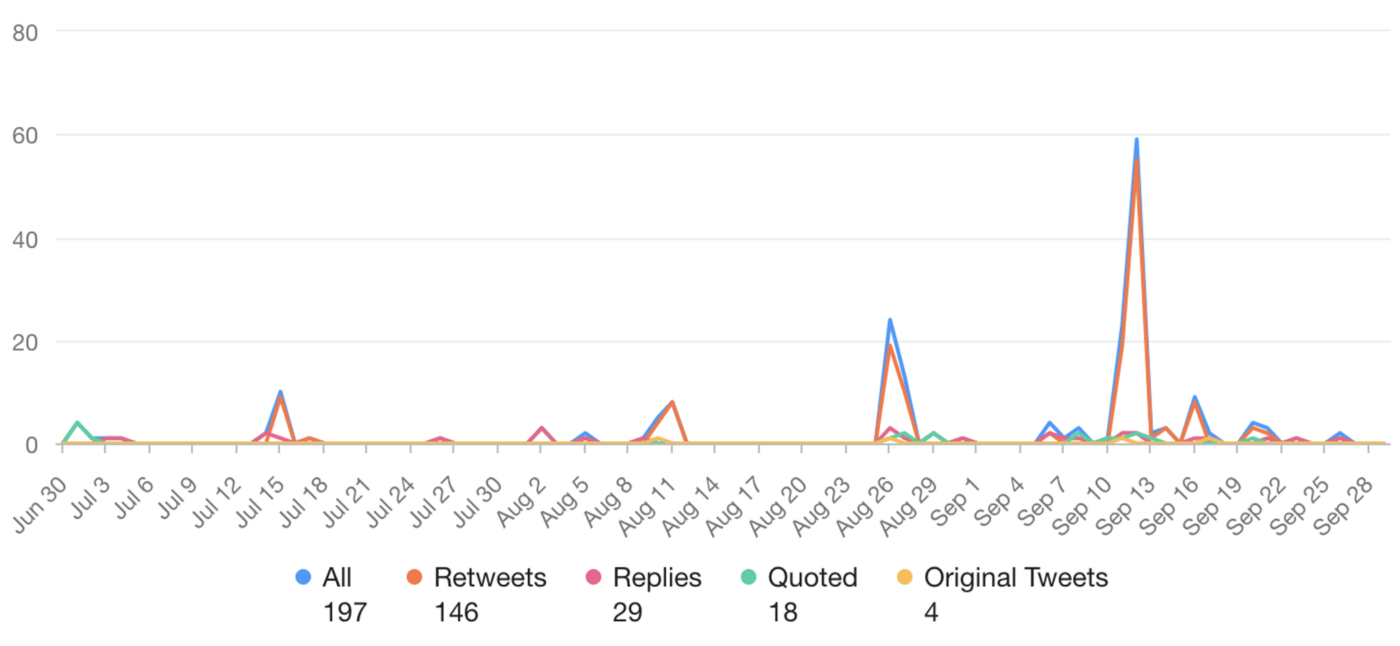A moment of truth for China’s vaccine diplomacy in Iran
Iranian officials echoed Chinese messaging while touting vaccines and criticizing the United States.
A moment of truth for China’s vaccine diplomacy in Iran
Share this story

BANNER: Iranian Foreign Minister Mohammad Javad Zarif and Chinese Foreign Minister Wang Yi bump elbows during the signing ceremony of a 25-year cooperation agreement in Tehran, March 27, 2021. (Source: Majid Asgaripour/West Asia News Agency via Reuters)
As the COVID-19 pandemic spread around the world, the Chinese government sought to contain the virus domestically and mitigate its reputational impact internationally. China invested heavily in aid and vaccine diplomacy with many smaller states. Media coverage and social media influence campaigns often accompanied these measures, framing China as a responsible actor keen on international cooperation in fighting a global pandemic. Iran was not exempt from these targeted efforts.
In recent years, bilateral relations between Iran and China have morphed into a strategic partnership, culminating in a much-hyped 25-year deal that allegedly brings the two states closer on trade, economic, and military affairs. These developments have come with a polarizing effect in Iran. Hardliners, with blessings from the Supreme Leader, support the so-called “pivot to the East’’ policy. They consider siding with China not only an opportunity for economic growth but also a blow to the United States in great power competition. The deal has also sparked a public outcry for more transparency about its details, but no such details have been released to date. To address this trust gap among Iranians, COVID-19-related narratives sought to position China as a reliable partner in critical circumstances.
The main points were propagated by Chinese state-controlled media, diplomats, and other government affiliates, particularly on Twitter, then amplified by Iranian diplomats, public officials, and conservative media (or vice versa). The Persian services of China Radio International (CRI) and China.com have been some of the main avenues for the spread of narratives favorable to both China and Iran. While these services have been active in Iran for years, the pandemic extended an opportunity to highlight China’s technological advances and economic resilience in the face of unprecedented circumstances.
In a discourse analysis of over fifty state media articles over the course of 2020, the DFRLab found several key themes, including positive coverage of the Iranian and Chinese governments’ handling of the pandemic, emphasizing close relations between the two nations, and demonizing the United States.
Touting Iran and China, criticizing the US
Narratives emanating from Chinese sources quickly found their way to state-affiliated media in Iran, such as Tasnim News, a notionally independent outlet that has been linked to the Islamic Revolutionary Guard Corps (IRGC), which published stories minimizing the pandemic’s impact on China’s economy. Other state-controlled outlets, such as Islamic Republic News Agency (IRNA), published about the promising outlook of cooperation between the two countries post-pandemic. In response to allegations of the coronavirus originating in a lab in Wuhan, China, state-controlled media such as People’s Daily promoted a conspiracy theory globally about the coronavirus originating from Fort Detrick US Army Base in Maryland. Chinese channels and diplomats in turn promoted this theory to Iranians. Similar theories had previously been endorsed by Iranian officials who openly speculated that COVID-19 was a biological attack against Iran and China.
As the coronavirus spread across Iran, the Persian services of Chinese media expressed solidarity with the people of Iran, announced the donation of publishing rights of several Chinese publications on COVID-19, and covered the Red Cross Society of China dispatching to Iran to provide testing equipment and medical gear. However, these public diplomacy efforts soon became a medium for influencing Iranian politics — and to some extent, undermining the administration of the now-former president, Hassan Rouhani.
In February 2020, as many countries imposed travel restrictions from China to contain the virus, Chinese platforms conveyed their government’s dissatisfaction with any “unnecessary” travel restrictions by Iran. Chang Hua, China’s ambassador to Iran, reiterated this view in his meeting with the CEO of Mahan Air, a private airline sanctioned by the United States due to ties to the IRGC. The airline operates frequent flights to and from China. Chang claimed that Mahan Air’s CEO had expressed interest in continuing flights between Iran and China. In the weeks that followed, a member of Iran’s parliament called out Mahan Air’s flights as one of the main sources of transmitting the virus, while domestic news outlets like Iranian Students News Agency (ISNA) criticized the Rouhani administration for submitting to China’s request to keep the flights operating.
Public diplomacy gone rogue
Perhaps the most telling instance of China’s polarizing effect on Iranian affairs was a Twitter spat between Kianoush Jahanpour, then spokesperson for Iran’s Ministry of Public Health, and Ambassador Chang Hua. On April 5, 2020, as Iran continued to struggle to contain the virus, Jahanpour subtly criticized China’s politicization of scientific facts about the coronavirus and its deadliness. Chang briskly defended China’s approach and suggested that Jahanpour “read carefully” the findings of the Chinese Ministry of Health before drawing conclusions.
Chang’s blunt response yielded a variety of reactions. Many Iranians perceived it as humiliating and a violation of diplomatic norms, while hardliners criticized Jahanpour for offending Iran’s critical partner and pressed for his resignation. This culminated in the spokesperson for Iran’s Ministry of Foreign Affairs apologetically touting China’s leadership in handling the pandemic and its generous aid to Iran and other countries. Chang approvingly tweeted that the friendship between Iran and China was not going to be shaken by “rumors.” The following day, Jahanpour thanked China for standing with the people of Iran amid the pandemic, effectively withdrawing his previous comments.
In June 2020, Jahanpour was removed from his position — a decision that he attributed, at least in part, to his comments about China. The incident tested the limits of China’s tolerance for disapproval and extended Chinese censorship even to authoritarian officials that are otherwise friendly to China. It also highlighted the vulnerability of Iran’s partnership with China, the extent of diplomatic care it requires to preserve, and the contentious public attitude toward China.

US sanctions: an extended opportunity for China’s vaccine diplomacy
As vaccines became increasingly available, Iran acquired over 10 million doses of Chinese vaccines Sinopharm and Sinovac and started a mass vaccination campaign in May 2021. While public skepticism about the quality and efficiency of Chinese vaccines remained rampant, Iranian officials continued to express gratitude toward China for delivering on its promises. They also blamed the United States and its sanctions regime, among other factors, for delaying the vaccination process in Iran.
The victory of conservative Ebrahim Raisi — and his anti-US rhetoric — in Iran’s June 2021 presidential elections may have catalyzed a more direct “naming and shaming” tactic on Twitter. On June 17 of that year, one day before the Iran elections, the Office of Foreign Assets Control (OFAC) in the US Department of Treasury issued a general license that authorized certain COVID-related transactions previously prohibited by Iranian sanctions regulations. The license meant that Iran could access and import Western vaccines through the World Health Organization’s COVAX program. Once the dust from the elections settled, and despite Iran’s enhanced access to vaccines, state-affiliated accounts began to promote the hashtag #جنایت_تحریم (Persian for #TheCrimeOfSanctions), in tandem with such keywords as “vaccine.” The campaign meant to underscore “vicious” US policies that affected lives of ordinary Iranians, particularly during a pandemic.

Between July 1 and September 30, 2021 (a few weeks after Raisi’s inauguration), 134 Twitter accounts promoted the hashtag #جنایت_تحریم a total of 197 times. Despite its limited scope, the campaign speaks to a deep-running tension in Iranian politics between the reformists and hardliners. Iranian diplomats, in particular Reza Zabib (@r_zabib), then the Assistant Minister of Foreign Affairs, underscored US sanctions as a key factor in delaying the mass vaccination process. But some self-proclaimed nationalists went a step further to also blame the previous, more moderate administration of Rouhani for putting too much trust in the United States.
According to this group, the recent OFAC General License proved that the United States was well aware of the adverse impact of its sanctions on Iranian society, yet moderates continued to downplay these effects on vaccine imports while trying to resume negotiations over Iran’s nuclear issue. Hardliner accounts such as @MOTAHED_osoul, the official Twitter account of the Principalist Party, amplified this wave.
While the DFRLab could not find evidence of coordinated efforts to manipulate this campaign by Chinese accounts, the messaging echoed Chinese narratives demonizing the US and paved the way for further praising of China as a reliable partner during the pandemic.

Throughout 2021, as more vaccines arrived from China, Ambassador Chang and other China-affiliated individuals amplified statements by Iranian officials that portrayed China as the largest, most reliable producer and exporter of vaccines in the world. The frequency of these posts, once again, increased after President Raisi’s inauguration in August 2021; this increase may suggest a concerted effort by the current administration to further appease China.
This case study underscores China’s persistent yet low-engagement public diplomacy campaign to influence the hearts and minds of Iranians. It also highlights the impact of US policies and sanctions on pushing Iran closer to China, which has a deeply polarizing effect on Iran’s domestic politics. Pro-China narratives continue to permeate domestic media and are amplified by Iranian officials and hardliners. However, China’s exercise of soft power over Iran has not been without a backlash. It continues to stir controversy among Iranians, further undermining the public’s trust in the government. It has also revealed China’s limited tolerance for criticism, even by other friendly authoritarian governments — a moment of truth for a world power that seeks to claim a place in global health leadership.
Cite this case study:
Simin Kargar, “A moment of truth for China’s vaccine diplomacy in Iran,” Digital Forensic Research Lab (DFRLab), February 14, 2022, https://medium.com/dfrlab/a-moment-of-truth-for-chinas-vaccine-diplomacy-in-iran-3ada4e6ffde.

